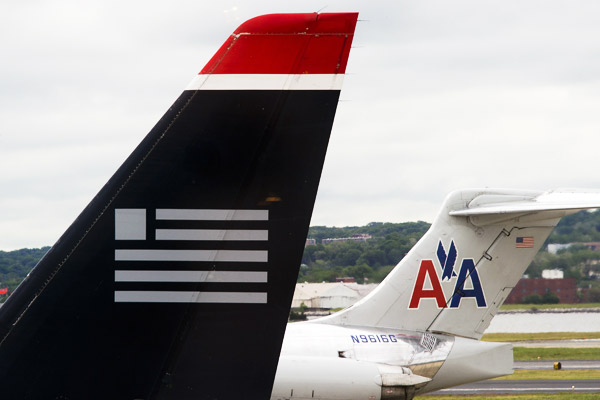
Airlines say that they must charge passengers baggage fees because more checked luggage means more costs incurred by the carrier. But how much extra jet fuel is burned due to luggage? Maybe $2 per bag tops.
That’s according to some analysis conducted by the Detroit Free Press, after extrapolating the costs (and savings) of lighter-weight equipment mentioned in an American Airlines report. Neither American nor airline industry groups refuted the estimate. “Your numbers I guess are correct,” an American Airlines spokesman said.
So how does the airline justify charging $25 for a service that costs the company only $2 in jet fuel? “It’s not directly linked to that,” he said, referring to the fuel costs incurred. “It’s a revenue stream.”
And a pretty impressive revenue stream at that! For every checked baggage fee paid to the tune of $25—fees that travelers increasingly deem to be “reasonable,” and that sometimes cost far more than $25—the airline only coughs up around $2 out of pocket.
(MORE: Why Hotels Aren’t Making a Killing on Fees Like the Airlines)
Strictly in terms of jet fuel, that is. As the wonks at FlyerTalk have discussed, the analysis by the Free Press is incomplete because it doesn’t factor in other costs incurred by airlines due to checked luggage, most obviously including the costs of employing people to handle checked luggage.
Yet it’s worth noting that some of the airline costs for handling luggage have decreased since carriers started charging for checked bags. The introduction of checked luggage fees not only provided airlines with a new revenue stream, it enabled airlines to cut costs—because the fee structure has pushed passengers to travel with fewer, lighter bags. That means airlines have been using less fuel due to baggage transport, and it also means they have been able to scale back on the infrastructure and staffers needed to deal with checked bags.
Back in 2010, the New York Times noted that the shift has also made it less likely for baggage handlers to hurt their backs, and therefore be less likely to receive work-related compensation or even need time off from work:
Passengers are now checking fewer, and lighter, bags to avoid the extra fees for heavy suitcases. As a result, the airlines have not been losing as many bags, and baggage handlers appear to be suffering fewer injuries.
(MORE: Airline Travelers, Your Future Will Look a Lot Like … Cleveland)
Overall, from the airlines’ perspective, the advent of baggage fees has proved to be a brilliant strategy. First off, they’ve managed to convince customers that the fees are reasonable and worthwhile. Leisure travelers may still grumble about the fees, but in the end forking over $50 round trip is often viewed as the easier and more sensible alternative to trying to cram everything you want on your trip in a carry-on bag.
Secondly, and more importantly, the strategy is one in which the airlines win no matter what the traveler decides in terms of checking or not checking a bag. If you don’t check a bag, the airline wins because it’s lightened the load on the plane compared to a decade ago, when you would have checked a bag because it was included in the fare paid. That lowers the airline’s fuel costs, thereby increasing profits. And if you opt to check a bag? Well, then the airline obviously wins because it gets to collect its fee, one that obviously more than compensates the carrier for the service provided.
More Must-Reads from TIME
- Where Trump 2.0 Will Differ From 1.0
- How Elon Musk Became a Kingmaker
- The Power—And Limits—of Peer Support
- The 100 Must-Read Books of 2024
- Column: If Optimism Feels Ridiculous Now, Try Hope
- The Future of Climate Action Is Trade Policy
- FX’s Say Nothing Is the Must-Watch Political Thriller of 2024
- Merle Bombardieri Is Helping People Make the Baby Decision
Contact us at letters@time.com